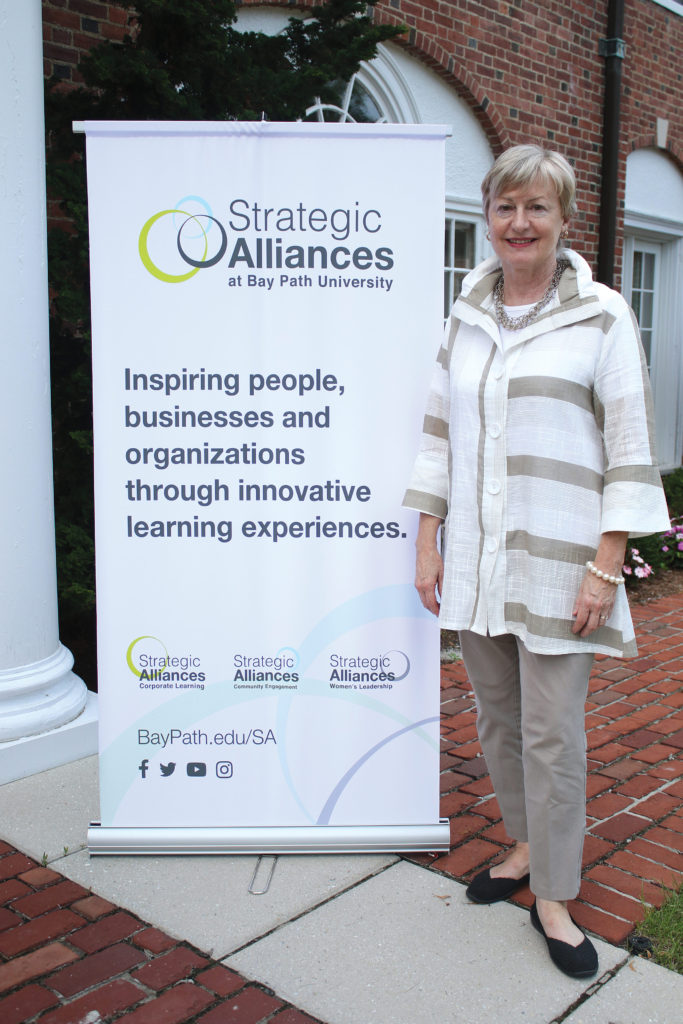Closing the Skills Gap
Bay Path’s Strategic Alliances Partners with Area Employers
By Kayla Ebner
The ever-changing workforce environment is a continuous challenge for employers seeking qualified people to fill their positions.
However, not all employers are looking for people with a college degree. In fact, the World Economic Forum reported recently that skills are in higher demand in the labor market than occupations and degrees.
This is one of the many reasons why Bay Path University started a new division on campus — Strategic Alliances, which provides customized training and learning experiences for area employees, as well as the latest online certifications and recertifications.
Caron Hobin, Bay Path’s vice president of Strategic Alliances, said the goal for this new division is a direct reflection of the overall mission of what was then Bay Path Institute when it was founded in 1897. And that is to always be attentive to the needs of the employers in the region and to make sure the university is preparing prospective employees to succeed in the workplace.
“That’s what I see our division doing here in an authentic way,” said Hobin, adding that this initiative strives to help employers target areas of recognized need through specialized training. Whether the focus is on cultivating emotional intelligence, working in teams, storytelling for success, or any other topic a company may need help with, Strategic Alliances uses carefully selected faculty from Bay Path as well as practitioners who have expertise in the topic to create programs that address these issues.
“Time is always of the essence, money is critical, so how do you provide training, and how do you help close the skills gap that employers say is definitely an issue out there?” said Hobin. “We do discovery sessions with companies and prospective clients, and we listen to what they are looking for, and then we create customized programs to meet their needs.”
She said these trainings may last anywhere from a few hours to weeks or months; however, she does her best to encourage companies to choose a lengthier program in order to get the most out of the experience, noting that, if the goal is changed behavior, employers aren’t going to get it with a one-hour training.
“Time is always of the essence, money is critical, so how do you provide training and how do you help close the skills gap that employers say is definitely an issue out there? We do discovery sessions with companies and prospective clients and we listen to what they are looking for, and then we create customized programs to meet their needs.”
Longmeadow-based Glenmeadow, which provides of variety of senior-living options, is one of about a dozen clients of Strategic Alliances. It recently completed a six-month leadership academy for all its managers.

“They used a best-practice model for adult learning, which is learning something new and then putting it into practice,” said Hobin. “It’s not theory; it’s not just a couple of hours, then you’re done. You go through an intensive training.”
Anne Miller, Glenmeadow’s vice president of Operations, scheduled six training sessions with Strategic Alliances for 20 managers at the facility, with each three-hour session going into detail on specific topics, with the aim of improving overall leadership skills. After each training session, Miller put together breakout sessions held at Glenmeadow that helped her employees apply what they learned from the trainings.
“We wanted to do some things that reinforced some of the training or actually made it come to life a bit,” Miller told HCN, adding that post-training sessions are important in order to help with retaining and applying what’s been learned.
These training sessions, conducted by a host of individuals from Bay Path, covered a wide array of topics ranging from how to de-stress to how to complete a good performance review, which Miller said are critically important for customer-service purposes within the many aspects of Glenmeadow’s broad business portfolio.
“I think it set a good base for us to continue the learning,” she said.
Interactive Approach
Glenmeadow’s case provides a perfect example of how Strategic Alliances works and why it was created, said Hobin, adding that, today, adult learners not only want to learn new information, but they want interactive, applied learning that goes along with it.
So, after the initial presentation session, Strategic Alliances hosts a practice session, where participants take the training they’ve received and apply it using strategies like role play in order to engage the employees.
Hobin said this training, coupled with ongoing work to determine specific needs among industry sectors and specific businesses, helps Strategic Alliances tweak its customized programs. And it also helps Bay Path when it comes to teaching students in its classrooms.
“We recognize that, with declining numbers of high-school graduates and with just a changing work environment going forward, we are going to need to find new markets,” she said, referring to the need to improve the skills of those already in the workplace and those seeking to advance within the workforce. “We can tell you very concretely that these are the skill sets that employers are looking for.”
Bay Path also partners with MindEdge, a provider of online continuing-education courses, to deliver various certifications and recertifications to any interested student or employee. When Bay Path launched its American Women’s College, its online degree program, Hobin said, she was hearing that more and more employers were not necessarily interested in people having a degree, but rather specific skill sets and certifications.
She hopes this will encourage students to get a professional certification before graduation, and she has a specific goal for the future — to have every Bay Path student complete a certification before they graduate.
For now, Hobin said Bay Path is implementing several strategies to reach out to the community, improve the visibility of Strategic Alliances, and build relationships with area business and economic-development-related agencies.
In addition to being a member of several local chambers of commerce, Strategic Alliances hosts virtual roundtables which provides viewers with a free, one-hour training course on various topics, which Hobin said have brought in many interested companies. These videos host a panel of professionals in the field and have focused on topics including using one’s power voice, having difficult conversations in the workplace, and diversity and inclusion.
Overall, Hobin wants Strategic Alliances to be a resource for the region, its business community, and individuals who want to be better-equipped to succeed in an ever-changing workplace.
“We’re here,” she said. “We’re interested in innovative approaches to professional development going forward.”




